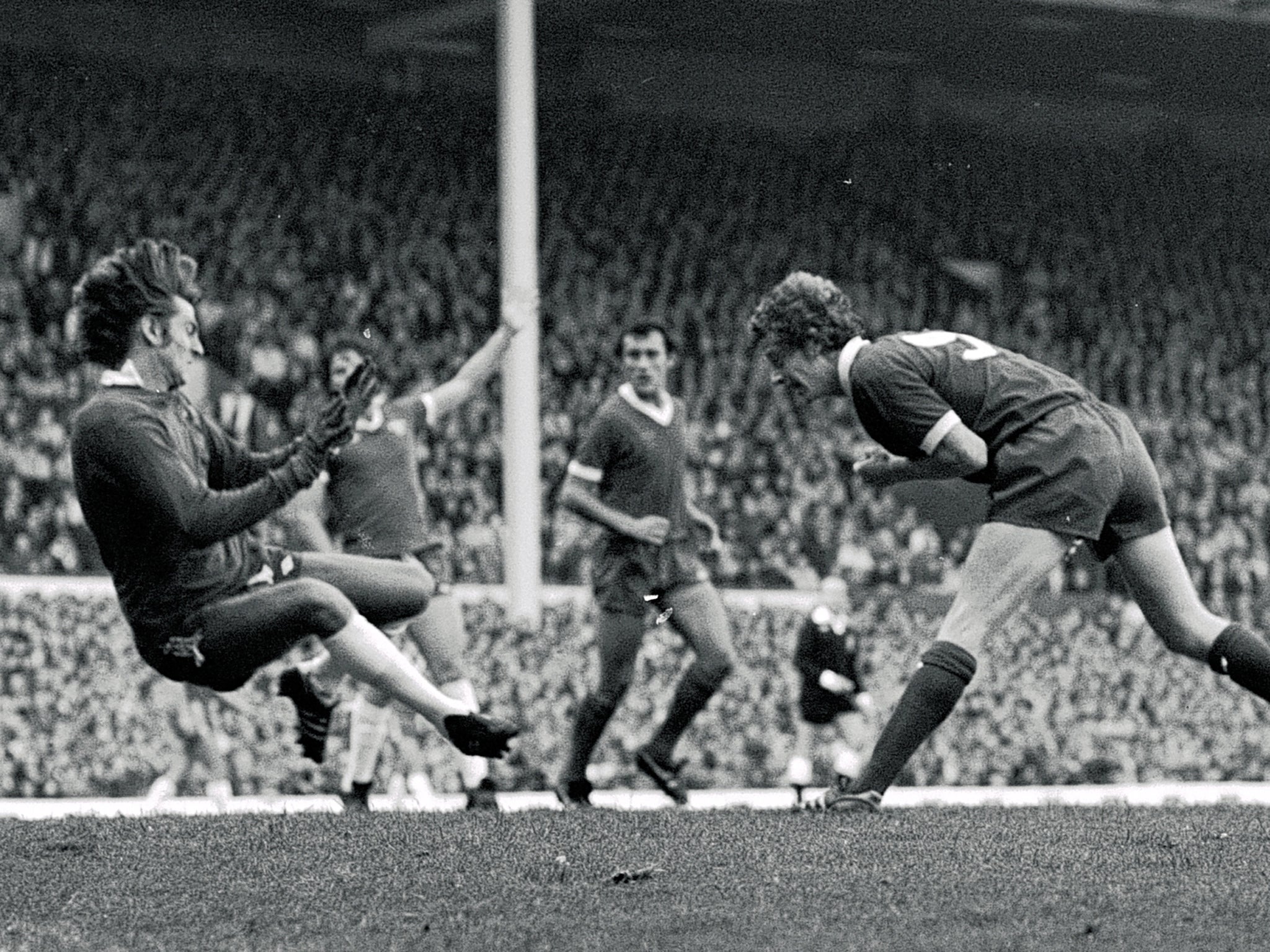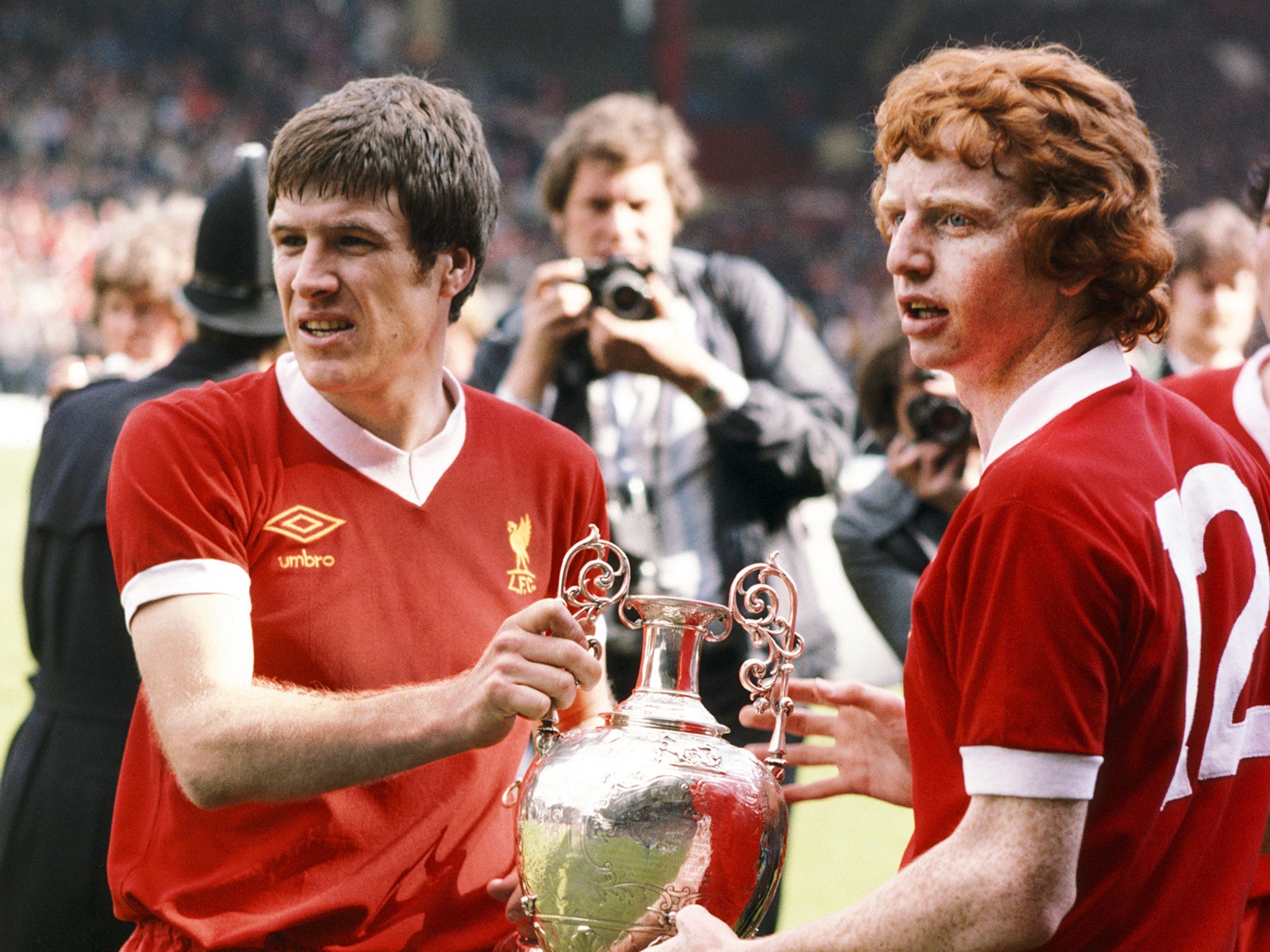David Fairclough interview: We were never hated... except in Manchester
David Fairclough was Liverpool’s goalscoring ‘Supersub’ in the club’s halcyon days, with United among his victims. He tells Ian Herbert about his struggles with his bit-part role

Your support helps us to tell the story
From reproductive rights to climate change to Big Tech, The Independent is on the ground when the story is developing. Whether it's investigating the financials of Elon Musk's pro-Trump PAC or producing our latest documentary, 'The A Word', which shines a light on the American women fighting for reproductive rights, we know how important it is to parse out the facts from the messaging.
At such a critical moment in US history, we need reporters on the ground. Your donation allows us to keep sending journalists to speak to both sides of the story.
The Independent is trusted by Americans across the entire political spectrum. And unlike many other quality news outlets, we choose not to lock Americans out of our reporting and analysis with paywalls. We believe quality journalism should be available to everyone, paid for by those who can afford it.
Your support makes all the difference.David Fairclough tells a story about a Liverpool reserve team match against Manchester United which puts those little Premier League training ground controversies – Oscar versus Diego Costa, Mario Balotelli versus pretty much anyone – into perspective.
He was an 18-year-old clambering through the foothills of a career that would one day assign him a place in Liverpool legend, while Tommy Smith, dropped to the second string, appeared to be heading in the opposite direction when they faced the old enemy together. Smith gave him dog’s abuse that day in October 1975.
“If I was up against you today, I’d be able to bring a bloody deckchair on to the pitch and sun myself,” he told Fairclough, and it was after the game that the teenager overheard the revered former captain, whom he had idolised as a boy, talking about him to Roy Evans, then reserve team coach. “Little bastard with the red hair” and “deserved a kick up the backside” were the fragments he caught.
FACT FILE: David Fairclough
Date of Birth: 5th January 1957
Place of Birth: Liverpool, England
Liverpool debut: 01.11.1975
Last appearance: 16.04.1983
- Fairclough made his Liverpool debut on the 1st November 1975 against Middlesbrough in the old First Division.
- He made a total of 154 appearances for Liverpool, starting his career during the Bill Shankly era, but showed his true worth during Bob Paisley’s management reign.
- During his time at Liverpool he scored 55 goals, 18 of were as substitute, which famously saw him become ‘Supersub’.
- Fairclough scored his first goal for Liverpool against Real Sociedad in a 6-0 win in the UEFA Cup 2nd Round, 2nd leg.
- Arguably his most famous goal came against St Etienne in the European Cup Quarter-Final at Anfield. The 20-year-old came on as sub, and scored the goal in front of the Kop, which saw Liverpool progress.
- But, England’s prototype ‘Supersub’ never made a senior appearance for the country of his birth, only a single U-21 appearance in 1976.
- The red-haired striker scored his one and only hat-trick for Liverpool against Norwich City at Carrow Road in 1990.
- In his eight years at Anfield, Fairclough had a trophy-laden career- winning the then old First Division on six occasions, including three League Cups, and five FA Charity Shields.
- He started in the winning 1978 European Cup Final team, one of three European Cup trophies to his name, including the UEFA Cup and UEFA Super Cup- all of which came during the 1970’s and 80’s.
- Fairclough went on to represent seven other clubs in countries such as Switzerland and Belgium, before ending his career at non-league Knowsley.
Fairclough, who scored in the match, will tell you in retrospect that the abuse was worth it – even though it felt personal when they shared a pitch at Ayresome Park as he made his first-team debut a few weeks later. Smith was not best pleased when the young forward did not chase a hopeful long ball he had punted. It was Kevin Keegan who jumped to his defence. “Fucking hell, Smithy. Give the kid a chance,” he shouted.
And was there any intervention from the management to prevent a player’s self-confidence being shot to pieces? Most certainly not. The point of the story – one of many told by Fairclough in an excellent autobiography which reveals his extraordinary memory for the small details of those great Liverpool days – is that the team policed and ran itself.
Bob Paisley – with his eye for a player and an opponent’s weakness which no manager has come close to matching – pretty much left them to it. The roll-call of arguments and punch-ups is consequently a long and colourful one. Alan Kennedy and Graeme Souness were involved in several. Fists featured. Then everyone moved on.
It was a British game with a distinctly British culture back then – in Liverpool’s case a northern and Scottish game because Paisley’s mistrust of southerners meant that he signed none of them. That goes some way to telling us why encounters with United, Liverpool’s opposition on Sunday, had something visceral and personal which will be alien to this weekend’s sides – Wayne Rooney apart.
Note there was no question of Smith, who had lifted the League Championship and Uefa Cup just two years before that Central League appearance, treating the reserve team with anything less than deference. “I had been brought up by Shanks to give my all for any Liverpool team,” he has since reflected on that game and Bill Shankly.
The encounters with United were fierce, despite the fact that there was “never a fear factor about them”, as Fairclough tells it, when we meet at a busy coffee house near his Merseyside home in Formby, where the warmth of the greetings from the clientele, including Everton’s Leighton Baines, reveal the obvious respect he commands.
“They were not one of our strongest rivals but there was always an added competitive edge to this fixture. I don’t think we were ever universally hated in those days, except maybe in Manchester…”
His own career was measured out with big moments against United. The exquisite solo goal which made a fool out of Gordon McQueen in a 3-0 win on Boxing Day 1978; the gilt-edged chance he missed – to his eternal regret – in the victorious 1983 League Cup final which was his Wembley swansong. And the searing disappointment of not featuring in the losing 1977 FA Cup final against Tommy Docherty’s United side.
What makes Fairclough’s memoir – Supersub – most vivid is its depiction of how it feels to be the perennial substitute. In eight years as a first-team player at Anfield, he played 154 times, and 62 of those appearances came as a substitute. On a further 76 occasions – the equivalent of two modern league seasons – Liverpool’s most famous No 12 sat on the bench and never came on.

The 1977 final seemed like a big opportunity. He was flying at that time, with the blistering pace which was always his big asset, and Paisley’s way of disclosing that he would be missing out was unusual. Fairclough answered a knock at the team’s Sopwell House hotel in Hertfordshire and found the manager loitering outside and beckoning him up the corridor to his own room. They had walked three or four paces around the corner and were just over the threshold of the boss’s room when he came out with it. “You won’t be playing tomorrow. But I will need you in Rome,” he said, offering the devastated young man the carrot of a place in the European Cup final against Borussia Mönchengladbach.
Fairclough had substantially helped put Liverpool there, with his iconic winning goal against St Etienne six minutes from the end of the quarter-final at Anfield.
There would be no place in the Rome squad either – an outcome which, to Fairclough’s mind, reflected Paisley’s unimpressive way of dissembling when it came to his selection. The prospect of being omitted again from the 1978 European Cup final side against Bruges at Wembley – despite his 19 goals in 29 games that campaign – led Fairclough to write out a transfer request in his Holiday Inn hotel room at Swiss Cottage. He planned to hand it to Paisley if not selected and it was actually in his pocket as he went through his warm-up.
Fairclough featured, though, and he would not leave Anfield until 1983, when Paisley offered him a new contract on reduced pay, from £600-a-week down to £425. He was still only 26 and his career took him to Canada and Switzerland before he returned home for less successful times with Norwich and Wigan.
In the decades since, there have been players who have reminded him of the Liverpool culture of those days. Luis Suarez – not an individual who is beloved to supporters of this weekend’s opponents – is among them, with his refusal to accept substandard contributions on the pitch.
“If you lost the ball you had to get behind the ball,” says Fairclough, who is now 59. “It used to scare you stiff. You were scared you were going to lose because of the bollocking you used to get off the players. I lose it and I’m here and Ray Kennedy is there and it’s: ‘What the fuck are you doing?’ The players around you were policing it as much as the staff. Getting the bollocking from your team-mates dragged up your level.”
Those days feel like an eternity ago. Liverpool and United – who in more recent years have obsessed over the stats and the philosophies, hired managers and then sacked them – could learn something from that beautiful, sometimes brutal, simplicity.
Supersub: The Story of Football’s Most Famous Number 12, by David Fairclough. De Coubertin Books. RRP: £18.99
Join our commenting forum
Join thought-provoking conversations, follow other Independent readers and see their replies
Comments